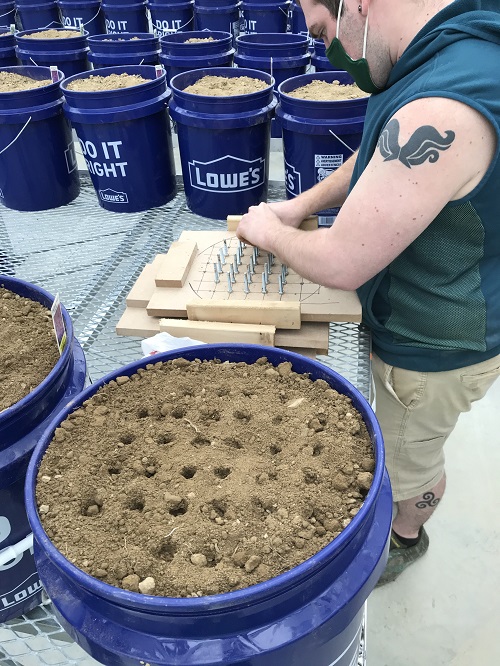A team of University of Maine at Presque Isle faculty members and students have begun work in the Zillman Family Greenhouse on a research project funded by a $12,333 USDA Specialty Crops Block Grant. The project aims to support Maine potato growers by enhancing the competitiveness of potato rotation crops through cropping system innovations.
The research team is working to determine if mycorrhizal inoculant can improve the seed yield and plant biomass of oat and barley varieties commonly grown in Maine. Mycorrhizae is a naturally-occurring beneficial fungi that enhances plant nutrient absorption. The project is led by Dr. Larry Feinstein, UMPI Associate Professor of Biology, and Jim Dwyer, UMPI Associate Professor of Agriculture and Dr. Robert Vinton Akeley Chair of Agricultural Science and Agribusiness. The two are heading a team that includes five UMPI students: Peter Baldwin, Chess MacArthur, Alex Mcquade, Claire Thompson, and Miranda Washinawatok.
“Potato growers in Maine often plant oats and/or barley in rotation with potatoes,” Dwyer explained. “The seed is harvested and sold and plant biomass is tilled into the soil in order to increase soil organic matter. Therefore, any process which may increase seed yield and soil organic matter would be beneficial to growers. Earning additional income during rotation years and increasing soil organic matter would enhance competitiveness of the potato specialty crop through more sustainable, diverse, and resilient cropping systems.”
This UMPI research project allows Dwyer and Feinstein to conduct a controlled greenhouse pilot study to better understand mycorrhizal inoculant’s seed yield and plant biomass potentials. The project will test two varieties of oats and two varieties of barley grown in soil collected from one of UMPI’s agricultural fields. The plants will be grown at three different nitrogen levels—low, medium, and recommended—and two mycorrhizal treatments will also be tested in a randomized block design. With five replicates of each treatment being grown, the project will encompass a total of 280 5-gallon micro-plots.
“We’ll be measuring above- and below-ground biomass and seed yield, and quantifying root mycorrhizal colonization to better understand the impact of mycorrhizal inoculation on plant yield at different nitrogen levels,” Dr. Feinstein said. “This project is providing our students with an excellent opportunity for hands-on greenhouse workforce development and allowing them to be part of an effort that leads to recommendations for Maine growers and the hope of increasing the profitability of their oat and barley rotation crops.”
The team’s research results will be used to formulate the experimental design of field trials that will be run in order to further refine recommendations.
Specialty crops are defined as fruits, vegetables, tree nuts, dried fruits, horticulture and nursery crops. The purpose of the Specialty Crop Block Grant program is to enhance the competitiveness of specialty crops. This is a USDA grant program which is administered in the State of Maine by the Department of Agriculture, Conservation and Forestry.
For more information about this project, contact Dr. Feinstein at 207-768-9498 or larry.feinstein@maine.edu. For more information about UMPI’s Agricultural Science program, contact Dwyer at 207-768-9417 or jimdwyer@maine.edu.
